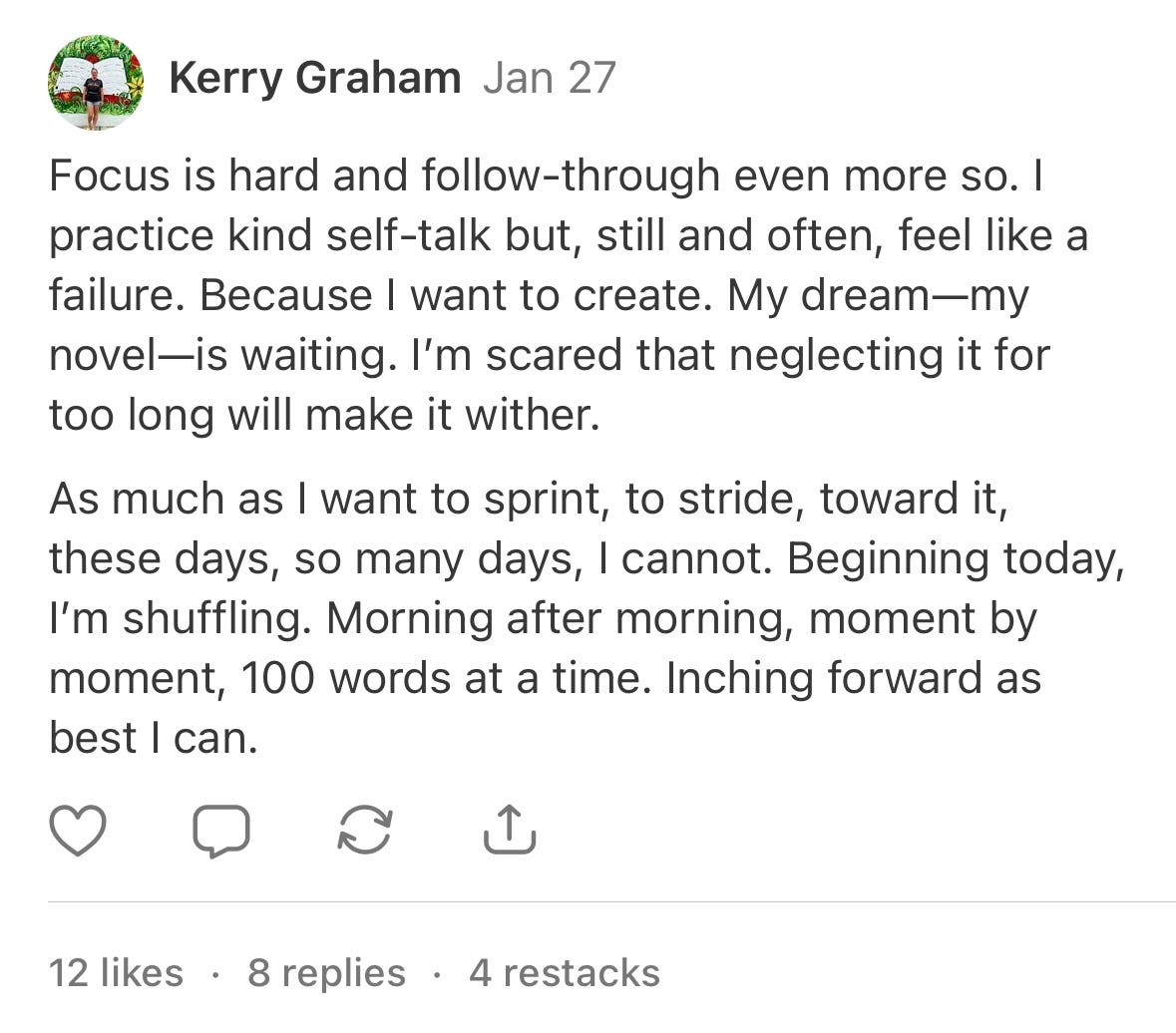Hello, writer dear.
One of the kindest things I’ve done for myself this year is commit to writing my Secret Novel. Despite wanting to for a lifetime, I’ve never written a ready-to-consume book. I spent a handful of years writing a book of vignettes (like this one) about my lovelies, then another couple of years writing a memoir. I stepped away from each for different reasons, though I can see myself returning to both one day. In the meantime, I’m damn near desperate to write and publish a book.
When the hook for my Secret Novel just appeared one afternoon last October, I decided to see if this book might be the one. I devoted NaNoWriMo to thinking through the plot and starting to get to know my characters. In January, during
’s #mini1000, I wrote my draft’s first 5,144 words and felt unstoppable.Except I was.
After the challenge, I got stuck. I wanted—needed—to keep going, but didn’t know how to on my own. I knew I wouldn’t be able to sustain 1,000 words a day, but was also afraid1 of losing momentum. For the sake of moving forward, even just incrementally, I made a promise to myself I could and would keep.
And, without burn out or overwhelm or hardly any frustration, I wrote my first draft. It’s missing parts and chaotic and has a ways to go, just like a first draft should be. It’s also where the soil meets the seed.
I was, and honestly still am, shocked that committing to something so small actually “worked.” I’m thrilled; not only did I achieve my goal—I had fun doing it. In just a few moments every day, I wrote a first draft more fluidly than ever before.
So of course I’ve been extroverted and enthusiastic about my new writing practice since the start.
Apparently, commitment doesn’t need to be intense, or even Very Serious. Maybe everyone else knows this already, but I’ve been evangelizing just in case, bringing it up a lot in writerly conversations, where we marvel at how nourishing a bite-size commitment can be.
My favorite part of these conversations is that
started her own 100-word commitment. I love her guidelines. I especially love that she’s writing.As much as it surely seems it, I’m not trying to tell you that you should make a 100-word commitment, too.2 I do hope you think about what sort of keep-able promise you can make to yourself. I also hope you’ll let yourself try.
I’ve been curious why this commitment works for me when so many others haven’t—here’s what I’ve figured out so far. You may already do these.3 If you don’t, I really recommend you try.
Focus on yourself.
Don’t let yourself worry about how other writers get it done. Your commitment, whatever and whenever it is, is just as good as theirs. I promise.
Choose something so small it seems like it won’t matter.
Especially when making a long-term commitment, you want it to be too itty-bitty to talk yourself out of doing.
Only commit to something you really, truly want to do.
If you start a commitment from the place of “should,” that promise will either be broken, or resentfully kept. This works best if you don’t dread doing it.
The audio at the top of this post has some more context for my thoughts around these, if you’d like to scroll up and listen.
I don’t know your writer dreams or your current capacity.4 But I do know that your words deserve you to show up for them. Whether you join #1000wordsofsummer, or promise yourself you’ll do something else entirely, I’d love to encourage you along the way.
I’m so glad you’re committing to your words. It’s important that you write them.
Thank you for being a writer, and thank you for being a reader of Writer Dear.
~Kerry
Based on a long history of personal experience.
But if you do, could you please tell me about it?
If you do, would you mind telling me how it looks in your life? I’m trying to internalize these as much as I can.
Though I’d absolutely love to—if you’re willing to share, please do!














Share this post